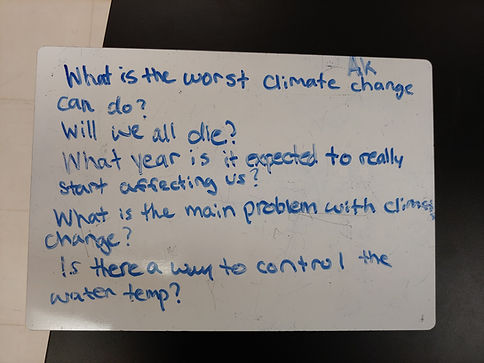Wonder
"I enjoyed researching the topics that interest me and then ask myself, what do I still wonder?"
O.T. - High School Student
Everyone wonders about something some of the time. Knowledge Building thrives on wondering.
By asking a student to wonder about something that really interests them, we open the door for exploration and learning. Whether from their curriculum, an event in the world, or identifying an authentic problem in their personal world, wondering invariably leads to questions and ideas. These questions become the rocket fuel for gaining knowledge, idea improvement and idea creation.
Listen to these students below talk about their introduction to Knowledge Building as they wonder and question surrounding a topic from their curriculum they chose to learn about.
What to Do
-
The best place to start wondering and question-asking is with your curriculum document. Find a unit or topic of study that naturally promotes wondering and question-asking - observant teachers often know which unit or topic this is going to be.
-
Now provide a ‘hook’ surrounding the unit or topic that promotes an outpouring of questions and ideas. The hook could be as simple as a high-quality video, a guest speaker, a famous speech, an experiment, a news-worthy event, or field trip.
-
To document their interest and wonderings during and after the hook, students complete a simple, open-ended writing exercise by providing answers to two questions. Download the template here.
“What information or ideas were interesting to you as you watched the video (guest speaker etc.)?”
“What are you wondering about after having seen the video? What questions come to mind?”
With these two questions, students take charge in the first step in Knowledge Building: student-generated inquiry surrounding real ideas and authentic problems about the world to help them understand it. The educational power of their questions and ideas should not be underestimated. It is the students who generate the questions and ideas for learning. It is the students who 'own' these. They did not come from a textbook nor assigned by the teacher. Motivation is then heightened to a higher level when students assume a sense of control and curiosity in what they are about to learn.
Below are sets of questions from two Knowledge Building communities surrounding climate change. In this case, the hook used for wondering was a video on climate change and its impact on humans. Note the curiosity! One can envision significant knowledge gains and idea creating as they work with these questions.
Finally, watch and listen how excited these students were when given choice in topics to learn along with the opportunity to generate their own questions for learning. Note the pride in ownership for their questions used for their subsequent learning.


Question for Moving Forward
-
What topic or unit do you think your students might generate a lot of questions and ideas? What is your thinking behind this choice?